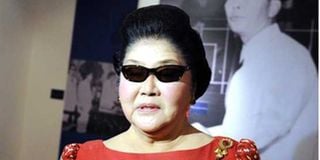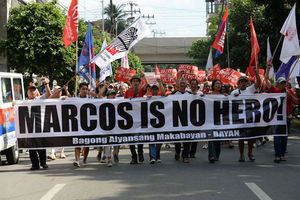
Philippine former first lady Imelda Marcos.
In the complex world of power, privilege, and political intrigue, few stories are as peculiar and tragic as the sale of Kenya’s wildlife to Imelda Marcos in the mid-1970s. What began as an official visit to Kenya by Imelda and her husband, President Ferdinand Marcos, quickly morphed into a controversial transaction that saw some of Kenya’s most prized wildlife shipped off to the Philippines to populate the Calauit Safari Park, a personal project of the Philippines’ First Lady.
But behind the safari and luxurious visits lay a deeper narrative, one entangled in Imelda’s marital struggles and her unrestrained political ambitions.
The secrecy surrounding the sale spoke volumes about the political climate in which it took place. It was the mid-1970s, a time when Kenya was under siege, not by external forces, but by internal corruption cartels that had capitalised on the aging President Jomo Kenyatta’s weakening grip on power. The country was in the hands of a small, ruthless gang — an elite clique that had quickly noticed Kenyatta's frailty and exploited it for their own gain. In this environment, wealth was pursued with a vicious tenacity, and those who stood in the way of such pursuits could easily disappear.
The Keekorok tour was organised by British tour guide and game hunter Tony Parkinson, known for serving elite clientele. He was a great friend of Charles Njonjo. Also aboard the Cessna plane was Cesar Virata, the Philippines’ finance minister, indicating the trip was not just about wildlife — it was statecraft blended with spectacle. Behind the scenes, orchestrating much of the visit, was Imelda's brother, Benjamin “Kokoy” Romualdez. Described as “street-smart and wily”, Kokoy was a shadowy figure constantly hovering near power. If any wildlife deal took place, Kokoy was likely involved.
Conducting business
The Marcos transaction, steeped in mystery and conducted far from the public eye, was characteristic of this era. Few people knew the details, and even fewer dared to ask questions. For the elite circle that had formed around the frail Kenyatta, secrecy was not just a means of conducting business but a survival strategy. In a country where political dissent and opposition were often met with swift, brutal consequences, transparency became a luxury no one could afford. Thus, animals, like in Noah’s Ark, left the port of Mombasa without even a whisper. In Kenya, like in the Philippines, political manipulation and economic plunder were the rule.
Those at the top of the food chain were not shy about using their newfound power to enrich themselves. The “Kiambu Mafia”, as they were later known, controlled not just the flow of wealth but the very levers of power. Their influence was felt in all sectors, from government contracts to land deals, and, in the case of Imelda Marcos (inset), the commodification of Kenya’s wildlife.
At the time, Imelda Marcos was a symbol of excessive wealth and unchecked influence, known globally for her extravagant spending and love of opulence. Between 1975 and 1982, she was recognised as one of the most influential jewellery buyers in the world, and her lavish tastes extended far beyond diamonds and designer clothes. She collected houses, art, apartments, and anything that caught her eye, often without regard for cost or consequence. This insatiable appetite for wealth was reflected in her decision to add an entire island stocked with exotic African wildlife to her list of possessions. There is a story behind the wildlife story – and why President Marcos never said “No” to his wife. Marcos’ biographers agree that after he was caught having an illicit affair with Dovie Beams, a minor motion-picture actress from Tennessee, he allowed Imelda to do whatever she wanted.
Personal paradise
Thus, Kenya, rich in biodiversity, became Imelda’s hunting ground, quite literally. The trip to Kenya in May 1976, organised under the pretence of attending a United Nations trade conference, soon veered off course when Imelda, along with a small entourage, visited Keekorok Lodge. It was here that the idea of creating a safari park back in the Philippines took root. The plan was simple: Import a selection of Kenya’s exotic wildlife to a private island, creating a personal paradise where her family, particularly her son Bongbong Marcos, could enjoy hunting and wildlife viewing. (BongBong is now the President).
But why would Kenya, a nation fiercely protective of its wildlife heritage, agree to such a deal? The answer lies in the politics of the time. It is unclear exactly who sanctioned the sale, as much of the documentation around this transaction has mysteriously disappeared or was never recorded. What is known, however, is that the deal was paid in cash, a sum substantial enough to remain off the books. The Philippines press reported the transaction after the fact, describing it as an under-the-table arrangement involving Imelda’s brother, Benjamin “Kokoy” Romualdez, a key figure in orchestrating such secretive deals.
Imelda’s desire to create her own safari park in the Philippines was more than just another extravagant indulgence. It was also deeply connected to the tumultuous state of her marriage. In the early 1970s, Ferdinand Marcos had been embroiled in a public scandal after being caught in an affair with Dovie. The affair shook the foundations of the Marcos marriage, damaging their public image as a devoted couple. Imelda, known for her ferocious temper and political cunning, used this moment of vulnerability to assert greater control over her husband.
“To atone for his marital sins, Imelda extracted from her husband a ‘hands-off’ relationship in which she could indulge herself limitlessly — and he made no effort to stop her. Her whims and wishes, unchecked, became increasingly grandiose: for clothes, jewelry, eventually international real estate,” wrote Beth Romulo in her book, Inside the Palace. It gave her the leverage she needed to push through her outlandish desires, while Ferdinand, desperate to keep his marriage intact and preserve his political power, turned a blind eye to her excesses.
Wildlife deal
As historians have noted, the wildlife deal was part of a broader pattern in Imelda’s behaviour. Her whims became increasingly grand, and her influence on her husband grew even stronger in the aftermath of the scandal. Ferdinand Marcos no longer had the political or marital capital to rein her in. Calauit Safari Park became a bizarre but telling symbol of this dynamic — a product of political fallout and personal indulgence. The Calauit Safari Park, gazetted in 1977, was not without consequences. In addition to displacing over 200 Filipino families, the park’s construction revealed the lengths to which the Marcoses were willing to go to satisfy their desires. Vanity Fair described it as a “ridiculous pet project”. But the Marcos family had giraffes, zebras, antelopes, and other herbivores on their island. For years, the park became a symbol of Imelda’s extravagant dreams and a reminder of the lengths to which dictators could go in their pursuit of power and prestige.
The approval of the sale of Kenya’s wildlife to Imelda wasn’t just an economic transaction. It was a manifestation of how wildlife was commodified in the 1970s when poaching was at its peak. For Imelda it was the intersection between political drama, marital strife, and personal indulgence — a means of asserting herself, building her own legacy amid a fractured marriage. For Kenya, it was a dark chapter in its conservation history, one that saw its natural treasures sold off in secret, with little regard for the nation’s heritage or the welfare of the animals.
Today, Calauit Safari Park remains a controversial symbol of the Marcoses' excess. The Kenyan wildlife that once roamed free in their natural habitat was reduced to mere trophies, victims of a marital power struggle playing out on the world stage. The story of the wildlife sale serves as a reminder of how raw power is exercised. When you hear Kenyans say that there is an attempt to sell the airport or Kenyatta International Convention Centre, it is because we have a history.
@johnkamau1







